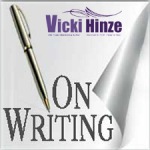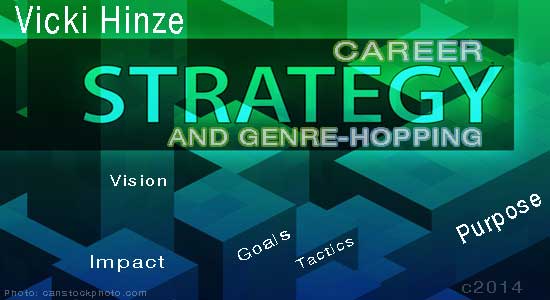 Authors tend to be bright and to have an array of interests. It’s required to do the job properly. But those same assets can also be liabilities when it comes to building a career.
Authors tend to be bright and to have an array of interests. It’s required to do the job properly. But those same assets can also be liabilities when it comes to building a career.
Building a career in writing is difficult. Few of the many who write are not otherwise employed. Often, those few who do write full-time, didn’t start out writing full-time. They wrote and built a reader base over a number of books, and then, when their writing income rose to a level where they could afford to stop working elsewhere, then they began writing full-time.
If writing full-time is your goal, then you’re likely eager to build that reader base as quickly as possible. That makes it imperative that you find your writing niche and stay in it long enough to do so. Let me explain.
Let’s say you write thrillers. You write one, publish it, and then another and another. Readers expect thrillers from you, and they look for you in that section of books. Because you’re publishing thriller upon thriller, you’re building momentum in the thriller genre, in the industry (important for reviews and peer recognition), and with readers who have read (or have had recommended to them by others) your books.
After four or five books, provided they are published regularly and without large gaps of time (at least one per year has been the norm, though now, every three months isn’t uncommon, particularly for independent publishing), you’ve established yourself as a writer of thrillers.
Now, you get an idea for a book that you love. It’s not a thriller. Let’s say it’s science fiction. You really want to write it—and, of course, you can. But should you?
If your goal is still to write full-time and to build the necessary foundation for achieving that goal, then no. You should stay with thrillers to keep your momentum going.
Does that mean you can never write this science fiction novel? Of course not. It does mean you’ll be building a different audience for it. Some of your readers will try the science fiction novel, and some won’t. You’ll gain some new science fiction readers who might, or might not, try some of your thriller novels. Either way, you’re going to have to build what amounts to two careers.
There are interim steps that you can take to minimize your risks, but you won’t negate them. What risks? Those of breaking your momentum and alienating your readers. How?
Here are a few tips:
1. Review your body of work for your author theme. Not the theme of the books, but your personal theme. What are the things are in all of your work, regardless of genre, type, or format? For example, my author theme is healing. Regardless of what genre I write in, at its core, the work has a healing theme.
2. Now, having reviewed your body of work, what constants appear in all your work? Example. In my works, you’ll find suspense, mystery and romance. The emphasis switches, but in all my work, you’ll find all three of those things.
3. Having determined your theme and your constants, use those things to shift from one genre to another. If in your thrillers, you’ve put most emphasis on romance, then in the science fiction novel do so also. If you’ve emphasized suspense, then be sure suspense has the emphasis. Those constants and your theme are likely the strong points with which readers relate and they’re more apt to relate to them in the new genre. This will aid the readers in making the leap with you.
What happens if you don’t ease the transition using constants and your author theme, but go totally outside it? You’ve started a second career and will need to build two separate reader bases. In other words, you’ve shoved your full-time writing goal further away.
What if the two types of books in the two genres are very different? You might consider writing a few bridge books to assist in the shift. For example:
1. In book 1, you incorporate the theme and constants.
2. In book 2, you incorporate the theme and constants but add in a secondary element that is representative of where you want to go in this second genre.
3. In book 3, you place emphasis on the new secondary element and author theme, and minimize the constants.
4. In book 4, you focus on the secondary element and author theme.
What you’ve done is all you can do to bring readers with you from where you were to this new place you want to be. For the record, I don’t recommend bridges if your goal is just to write something different. Reserve bridges for the time when you want to switch genres, or to switch sub-genres within a genre. An example of sub-genres within a genre would be shifting from romantic suspense to romantic thrillers. Or romantic suspense to military romantic suspense.
In both, your focus is on the romance—the development of the relationship between hero and heroine—but the secondary focus shifts from suspense to thriller. Or from suspense to incorporating the military element into the suspense.
If you wish to write one atypical book, it’s more practical to write it under a different name. That signals readers that this is a different book. I did this in Girl Talk: Letters Between Friends. Written in epistolary, it was different for me. But I incorporated romance, suspense, and mystery elements and stayed with my healing author theme.
As writers, we can write what we choose. But if we’re writing to sell, we need to be aware of the impact on the whole our writings each piece of it has. Whether it’s a short story, a quick-read or novella, or a novel, it all relates and becomes part of our body of work. And readers look to each work to draw conclusions on the whole of our work.
You can do what you like, but do it recognizing the impact on your career and your goals. Do it knowing that you’re setting the stage for readers to interpret your body of work. And be sure that you weigh your options and that impact before you act.
One last thing. Note that always—whether in Genre, in Transition books, or in Bridge books, I resolutely recommended your author theme stay put. Why?
Because it can’t be removed—not consistently through a project—and because it represents the essence of you, the author, that shines through in the book in a million and one ways. What you think, the details you deem important, the way you structure a project, the way you react and your characters react—your world view and what you deem significant. All those things are part and parcel of your author theme.
You can try to edit them out, but you’ll fail. Because these things go to the core of you, the human being, and that can’t be separated from you, the writer.
If you work with yourself, you’ll fare much better than if you work against yourself. If you do the review and recognize your theme, you can then work with it, and that produces your strongest, most consistent and most convincing wor
_____________________________
© 2014, Vicki Hinze. Hinze is the award-winning, USA Today bestselling author of nearly thirty novels in a variety of genres including, suspense, mystery, thriller, and romantic or faith-affirming thrillers. Her latest release is Down and Dead in Dixie. She holds a MFA in Creative Writing and a Ph.D. in Philosophy, Theocentric Business and Ethics. Hinze’s online community: Facebook. Books. Twitter. Contact.






